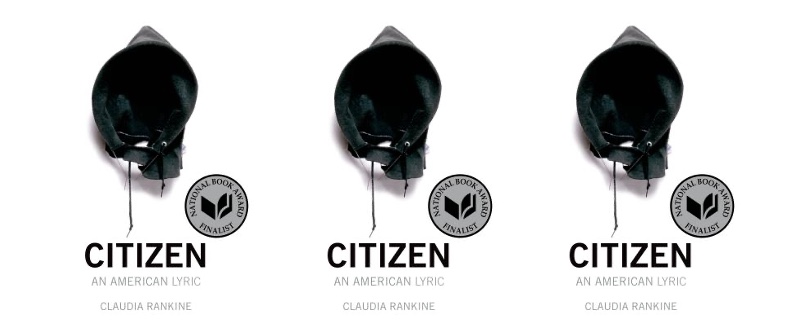Vigilance
On Claudia Rankine’s Citizen.

“Yes, and this is how you are a citizen,” we read as we approach the end of this book about race, identity, language, and memory: “Come on. Let it go. Move on.” The phrases echo others sounded on earlier pages in their urging that the consciousness at work—the “you” being addressed—evade engagement with racial hostility, disregard insults and slights, swallow pride in the face of prejudice ignorant or intentional: “Then the voice in your head silently tells you to take your foot off your throat because just getting along shouldn’t be an ambition.”
Winner of the 2014 National Book Critics Circle Award in Poetry (in a sign of the book’s multivalent singularity, it was also a finalist in the Criticism category), Claudia Rankine’s remarkable book is about being a citizen in an uncivil union, a relationship that renders one’s figure in the world alternatively ominous and invisible. Innovative in both structure and substance, Citizen unfolds at the start in succinct and carefully composed paragraphs that evoke the discourtesies, aggressions, dismissals—call it the realities—that are inherent in both the private and the public lives of people of color in a society shaped by white priorities. The persistent “you” implicates the reader in the poet’s recognitions, while Rankine’s intimate voice, as if talking to itself, struggles to find meaning in a recurring daze of provocations. The litany of incidents Rankine recites begins in an elementary school classroom and continues into adulthood and professional life, when, for instance, a colleague complains, “his dean is making him hire a person of color when there are so many great writers out there.” She distills the anguish of these recollected moments with keen awareness:
As usual you drive straight through the moment with the expected backing off of what was previously said. It is not only that confrontation is headache- producing; it is also that you have a destination that doesn’t include acting like this moment isn’t inhabitable, hasn’t happened before, and the before isn’t part of the now as the night darkens and the time shortens between where we are and where we are going.
In a brilliant résumé of the career of tennis champion Serena Williams, Rankine contemplates the athlete’s rare but powerful reactions to flagrant discrimination on the court:
. . . it is difficult not to think that if Serena lost context by abandoning all rules of civility, it could be because her body, trapped in a racial imaginary, trapped in disbelief—code for being black in America—is being governed not by the tennis match she is participating in but by a collapsed relationship that had promised to play by the rules.
Something like a gallery, Citizen is unconventional in form as well as force: Photographic images and paintings are juxtaposed with text, and a section of the volume presents scripts for “situation videos.” Created with John Lucas, these are collage-like constructions of quotations and meditations on injustice, discrimination, and violence as reflected in specific instances, including Hurricane Katrina, the killings of Trayvon Martin and James Craig Anderson, the death of Mark Duggan at the hands of British authorities, and the policy of stop-and-frisk adopted by urban police forces.
Given such deadly serious subject matter, the book’s subtitle—An American Lyric—might seem ironic, yet it holds the key to Rankine’s most telling achievement: The composed space of reflection and repose that is the domain of lyric poetry provides a magnifying frame for everything Citizen examines, as the book’s initial paragraph suggests: “When you are alone and too tired even to turn on any of your devices, you let yourself linger in a past stacked among your pillows. . . . [The moon’s] dark light dims in degrees depending on the density of clouds and you fall back into that which gets reconstructed as metaphor.” Exactly because Rankine is a lyric poet of such extraordinary gifts, she cannot comply with the forgetfulness her citizenship demands: “Come on. Let it go. Move on.” In the pages of Citizen, she holds fast to what she’s seen, brings close what others have felt and suffered, and breathes language into the deadened air of grief, forcing herself—and her readers—to scrutinize the pain that racism provokes, and to stand still and ponder its cumulative injury and sorrow.
Excerpted from the book, 1,000 Books to Read Before You Die by James Mustich. Copyright © 2018 by James Mustich. Published by Workman Publishing.
